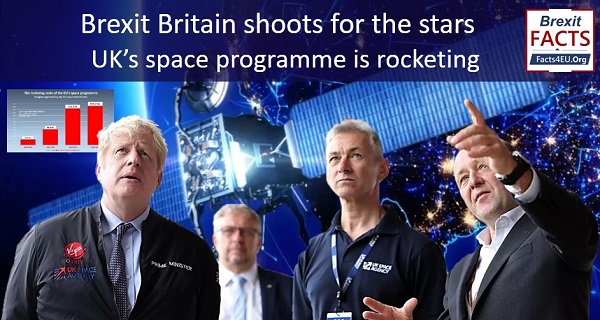Brexit Britain shoots for the stars – UK’s space programme is rocketing

This report has been co-published with our affiliated organisation, Brexit Facts4EU.Org. We are most grateful for their original research into the raw data which backs what follows.
Leaving the EU’s bloated ‘Galileo’ project behind, the UK is ready to go into orbit
On Tuesday last week the Government announced the UK’s first space launches from British soil will take place this summer. From Cornwall in the deep south-west, to the Shetland Islands in the far north-east, Brexit Britain has a great story to tell. Last week the space news just kept on taking off.
On Friday (13 May 2022) the Government’s announcement was followed up by impressive official figures from the UK Space Agency. Employment in the booming UK space sector is now up to nearly 50,000 across the UK, with revenues of £16.5bn in 2020 alone.
SUMMARY
Latest official information and figures on UK’s booming space industry
- First-ever space launches from British soil to take place this summer in Cornwall
- Shetlands-based SaxaVord announced partnership with Astra Space Inc for satellite launches
- Another Scottish company, Orbex, revealed prototype of first-ever vertical rocket system from UK soil
- Employment in the UK space sector hit 46,995 in 2020, up by almost 3,000 (+6.7%)
- Space sector income increased to £16.5 billion
- Exports accounted for around a third (32%) of this total
- Space manufacturing, including satellites, spacecraft, launch vehicles, instruments, increased to £2.27 billion
- Meanwhile the EU’s space programme is 15 years late and massively over budget
Photo credit: SaxaVord UK – click to enlarge
Brexit Britain is jetting off this summer…. into space
We start with the launch of satellites this summer from Cornwall.
1. Spaceport Cornwall
Built by Hampshire-based ‘In-Space Missions Ltd’ (now part of BAE Systems), Prometheus-2 is a collaboration between the UK Ministry of Defence and international partners including the US National Reconnaissance Office (NRO).
The first two launches will take place from Spaceport Cornwall https://spaceportcornwall.com/ – an exciting development which heralds the birth of a new era for high-tech jobs in the post-Brexit world in the West Country.
Built in Brexit Britain, collaborating with global partners, launched from the UK
 Director Space at the MoD, Air Vice Marshal Harv Smyth, said:
Director Space at the MoD, Air Vice Marshal Harv Smyth, said:
“This is a great example of the power of international collaboration – a key tenet of our Defence Space Strategy. Prometheus 2 will deliver immense value to the UK MoD’s future space programme and, thanks to our partners in the National Reconnaissance Office, this highly-capable satellite will launch from UK soil this summer.
“I am hugely proud of what we have achieved together and this is just the beginning.”
– Director Space at the MoD, Air Vice Marshal Harv Smyth, 10 May 2022
The Prometheus-2 rockets will initially be carried on a modified Boeing 747 jet from Virgin Orbit named Cosmic Girl, before being dropped from the aircraft and then powering off into space.
As if the news from Cornwall were not enough this week, at the other end of the country we have both SaxaVord UK and Orbex Systems. On Tuesday these Scottish companies separately each announced important news in the UK’s space race.

2. SaxaVord Spaceport, Shetlands
SaxaVord UK in Shetland is a fast-growing company. On Tuesday thay announced a partnership with Astra Space Inc to provide dedicated orbital launch services to a growing European satellite market. Astra was the first space launch company to be publicly traded on Nasdaq.
Located on the Lamba Ness peninsula on the island of Unst, the spaceport will host up to three launch pads and three integration hangars, each for shared or exclusive use.
(Island of Unst, Shetland – Location of the new SaxaVors spaceport. Photo courtesy of SaxaVord UK.)
Subject to definitive agreements and regulatory approvals, SaxaVord Spaceport rocket launches are expected to begin in 2023.
 “Without belief a vision cannot be realised and without persistence a vision will fail. We believed and we persisted, and our vision is now reality. SaxaVord is the UK’s Pathfinder Space Port.”
“Without belief a vision cannot be realised and without persistence a vision will fail. We believed and we persisted, and our vision is now reality. SaxaVord is the UK’s Pathfinder Space Port.”
– Frank Strang, CEO, SaxaVord UK

“This agreement between SaxaVord Spaceport and Astra is great news for Shetland and represents another step towards our shared ambition of bringing vertical launch satellite capability to Scotland.”
“Companies like this are vital to achieving the aims of our National Strategy for Economic Transformation that will support a nation of entrepreneurs and innovators in areas like small satellite technology and Scotland’s growing space industry.”
– Ivan McKee, Scottish Minister for Business, Trade, Tourism and Enterprise
The new SaxaVord UK spaceport has been designed to host a wide variety of launch missions on rockets with payloads of up to 1.5 tonnes. Shetland has a long history of serving and supplying complex industries such as oil & gas with sophisticated engineering needs and excellent logistics, and looks well-placed to capture a proportion of the European market.
3. Orbex, Forres, Scotland
Also on Tuesday last week, Scottish company Orbex unveiled the first of a new generation of launch vehicles designed to propel the new generation ‘micro-satellites’ into orbit. The company claims this will represent the first ever vertical rocket launch to orbit from UK soil.
It is scheduled to take place at a new test facility in Kinloss, Scotland. Orbex´s Prime rocket is the first ‘micro-launcher’ developed in Europe to reach this stage of technical readiness, says the company.
The 1,293 space organisations the length and breadth of the UK
According to the UK Government, there are now 1,293 space organisations located across the UK (including Northern Ireland), with Scotland responsible for around one fifth of the entire UK space workforce.
Spaceports in Scotland, Wales and England are expected to generate more jobs in the coming years, alongside the growth of regional space clusters, international investment, and emerging technologies such as in-space manufacturing and debris removal.
 On Friday Science Minister George Freeman MP said:
On Friday Science Minister George Freeman MP said:
“The £16.5 billion space sector is a major contributor to a strong and secure UK economy, and it’s promising to see it generate thousands of new high-skilled jobs in the face of global economic headwinds.”
“As we support new SpaceTech clusters from Spaceports in Cornwall and Scotland to satellite manufacturing and robotics from Glasgow to Warwick to Stevenage, this will help level-up the UK. Looking ahead to the first satellite launches from the UK this year, this is an exciting time for this high growth sector up and down the country.”
Rt Hon George Freeman MP, Science Minister, 13 May 2022
Meanwhile in the EU, there’s a space-time continuum, costing an astronomical amount of money
For many years the EU has been working on its ‘Galileo’ and ‘Copernicus’ space projects. Facts4EU.Org has previously reported on the EU’s space ambitions, with a comprehensive suite of detailed reports.
French-dominated, massively over-budget, and many years overdue, following the Brexit vote the EU nevertheless chose to exclude the UK from its space programmes, supposedly on security grounds. When the UK starts launching these will be the first launches from a (western) European country.
SUMMARY
- So far the Galileo Project has taken 28 years from initiation in 1994
- This EU taxpayer-funded and EU Commission-managed SatNav system is still only 73% complete
- The UK was a major funder and a significant provider of technical expertise
- The original deadline for completion passed 15 years ago
- The budget has rocketed to 17 times the original figure
- The project has missed so many deadlines it’s impossible to say when it will be completed
- So far it has been 28 years in the making and 15 years overdue from its first deadline
- None of the launches have taken place from European soil
© Brexit Facts4EU.Org 2022






